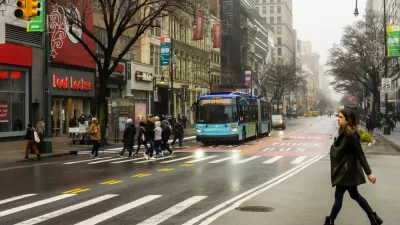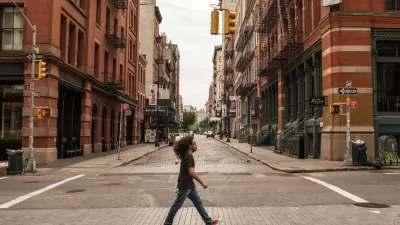Preferences in the characteristics of communities—from the shape of the built environment to demographics—reveal stark partisan preferences. Planners are faced with the task of navigating ideological divides.

"Republicans and Democrats express sharply different preferences about their ideal communities and house sizes," writes Bradley Jones to explain research from the Pew Research Center. "And while large numbers of people in both parties say it is important to live in a community that is a good place to raise children, partisans diverge on whether it is important that a community is racially and ethnically diverse."
Some of the distinctions in partisan preference can be boiled down to planning considerations implemented by zoning codes, according to Jones:
Nearly two-thirds of Republicans and Republican-leaning independents (65%) say they would prefer to live in a community where houses are larger and farther apart, but schools, stores and restaurants are several miles away.
By contrast, a majority of Democrats and Democratic leaners (58%) would rather live in a community in which houses are smaller and closer to each other, but schools, stores and restaurants are in walking distance.
The Pew research Center conducted a survey in September 2019 to produce the findings. More details on the methodology and the findings are available in the source article.
FULL STORY: Big houses, small houses: Partisans continue to want different things in a community

Alabama: Trump Terminates Settlements for Black Communities Harmed By Raw Sewage
Trump deemed the landmark civil rights agreement “illegal DEI and environmental justice policy.”

Study: Maui’s Plan to Convert Vacation Rentals to Long-Term Housing Could Cause Nearly $1 Billion Economic Loss
The plan would reduce visitor accommodation by 25% resulting in 1,900 jobs lost.

Planetizen Federal Action Tracker
A weekly monitor of how Trump’s orders and actions are impacting planners and planning in America.

Waymo Gets Permission to Map SF’s Market Street
If allowed to operate on the traffic-restricted street, Waymo’s autonomous taxis would have a leg up over ride-hailing competitors — and counter the city’s efforts to grow bike and pedestrian on the thoroughfare.

Parklet Symposium Highlights the Success of Shared Spaces
Parklets got a boost during the Covid-19 pandemic, when the concept was translated to outdoor dining programs that offered restaurants a lifeline during the shutdown.

Federal Homelessness Agency Places Entire Staff on Leave
The U.S. Interagency Council on Homelessness is the only federal agency dedicated to preventing and ending homelessness.
Urban Design for Planners 1: Software Tools
This six-course series explores essential urban design concepts using open source software and equips planners with the tools they need to participate fully in the urban design process.
Planning for Universal Design
Learn the tools for implementing Universal Design in planning regulations.
Caltrans
Smith Gee Studio
Institute for Housing and Urban Development Studies (IHS)
City of Grandview
Harvard GSD Executive Education
Toledo-Lucas County Plan Commissions
Salt Lake City
NYU Wagner Graduate School of Public Service





























